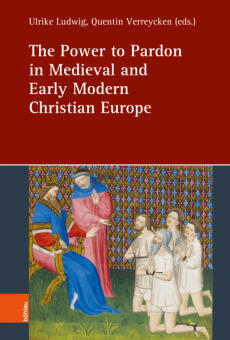A new volume on pardons in the Middle Ages and early modern period has been published

A new volume entitled The Power to Pardon in Medieval and Early Modern Christian Europe has been published in the Käte Hamburger Kolleg series. Edited by Ulrike Ludwig and Quentin Verreycken, this collective volume comprises eleven articles devoted to the central importance of the act of pardon in medieval and early modern Europe.
In the Christian legal culture of the Middle Ages and early modern period, the right to pardon was one of the most visible manifestations of sovereignty. For rulers, pardon was a means of enforcing peace and asserting the primacy of their judicial authority, while for subjects it was primarily a way to save their lives and escape punishment – often at a lower cost than other mitigating measures.
This publication examines how pardons operated within complex legal systems in which various means of conflict resolution coexisted and the litigants had to navigate through multiple levels of authorities.
The series
The series ‚Einheit & Vielfalt im Recht | Legal Unity & Pluralism‘ is edited by Ulrike Ludwig and Peter Oestmann and is published by Böhlau Verlag. The series conceptualises legal pluralism as a structural characteristic of law itself. We can therefore speak of a relational and historically changeable association between unity and pluralism in law. The book series intends to comprehensively illuminate these connections in their cultural polymorphy interdisciplinarily, transspatially and interepochally. The volumes are published in German and English and are predominantly open-access.
Bibliographic data
Ulrike Ludwig/Quentin Verreycken (Ed.): The Power to Pardon in Medieval and Early Modern Christian Europe, 2025, 295 Seiten, gebunden (Einheit & Vielfalt im Recht / Legal Unity & Pluralism, Bd. 6), Böhlau, Printed Volume: ISBN: 978-3-412-53385-4, Preis 50,00 EUR; E-Book: ISBN: 978-3-412-53386-1, Open-Access.

